|
|
|
Sort Order |
|
|
|
Items / Page
|
|
|
|
|
|
|
| Srl | Item |
| 1 |
ID:
120852
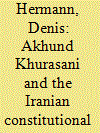

|
|
|
|
|
| Publication |
2013.
|
| Summary/Abstract |
During the last 15 years several important sources have been published allowing the appraisal of the role of ulema during the Iranian constitutional movement (1906-11) and thus opening new lines of research. The 2006-7 edition compiled by Muhsin Kadivar from several unknown documents written by Akhund Muhammad Kazim Khurasani (d. 1330/1911) make it possible to measure his importance and his impact on the evolution of the events as well as his ideological influence. The usuli rationalist jurist Akhund Khurasani was considered at the beginning of the constitutional movement as one of the principal mujtahid and marja'-i taqlid of the Shiite world, and was possibly the best-known. After introducing the life and work of Akhund Khurasani and the theoretical principles (nazari) that he uses to define the constitutional movement, the main topics that arise in the study of this literature are identified. Particular attention is paid to his position as a rallying point and legitimizing force, his enthusiasm for an ambitious progressive policy, his intricate relations with western powers and his links with the Qajar.
|
|
|
|
|
|
|
|
|
|
|
|
|
|
|
|
| 2 |
ID:
120848
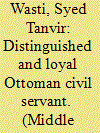

|
|
|
|
|
| Publication |
2013.
|
| Summary/Abstract |
The nineteenth century represented an important period in the attempts of Ottoman Turkey to bring all its institutions, civil and military, up to date so as to be able to prevent disintegration of the empire. The Ottoman civil service bureaucracy became an efficient part of this modernizing process. Hüseyin Nâzim Pasha, who served both as minister and governor of major provinces, provides an important example of Young Ottoman thought, loyal but forward-looking, steeped in tradition but not blindly bound by it, industrious and well able to represent the changing face of Turkey in both the private and the public spheres. His life represents the zeitgeist of the times with great accuracy.
|
|
|
|
|
|
|
|
|
|
|
|
|
|
|
|
| 3 |
ID:
120854
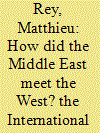

|
|
|
|
|
| Publication |
2013.
|
| Summary/Abstract |
In 1949, the United Nations sent its first mission to the Middle East in order to provide help to Palestinian refugees. This was the first step towards a development policy from this international institution. Analyses of the Iraqi (1952) and the Syrian (1955) missions can help an understanding of how Middle Eastern countries were involved in the work of the new international organization. Indeed, these investigations testify to a new policy to improve economic and social conditions in the Middle East. This research points out interactions between national institutions, local personalities and international institution in order to give an idea about the methods of communication between the Middle East and the providers of United Nations assistance.
|
|
|
|
|
|
|
|
|
|
|
|
|
|
|
|
| 4 |
ID:
120850
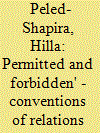

|
|
|
|
|
| Publication |
2013.
|
| Summary/Abstract |
This paper examines the difference in the way romantic connections between men and women are presented in the novels of the émigré Iraqi author Gha?ib u?ma Farman (1927-90) in comparison to the preceding generation of writers, as an expression of how ideology affected the artistic course taken by Communist authors, in view of the fact that relations between the sexes were a taboo subject in Arab literature. The paper shows the ways in which Farman copes with the taboo in the conservative patriarchal society in which he grew up and the rhetorical and thematic devices he uses to shatter accepted conventions. The works serve as a prism to examine the triple bond between political and social ideology, language and coping with issues of the relations between the sexes, by exploring selected issues relating to sexuality as expressed in these works: sexual relations outside marriage, forced marriage or prevention of marriage, and the treatment of the daughter-in-law by the husband's family.
|
|
|
|
|
|
|
|
|
|
|
|
|
|
|
|
| 5 |
ID:
120853


|
|
|
|
|
| Publication |
2013.
|
| Summary/Abstract |
This article probes the transformation of Kemalism to a xenophobic nation-statism with a strong anti-western animus diluting its self-styled westernism and elitism in response to the rise of the reformist-Islamist ruling JDP and its patchy liberal rhetoric and pro-EU stance. The article points to the novel qualities of the Kemalism of the 2000s but also attests to its inherent anti-elitist, anti-liberal and anti-intellectual nature that reigned in the 1930s given that the Kemalist project in the inter-war period involved the denunciation of the Ottoman establishment with its elite and intelligentsia and its replacement with an intelligentsia of its own that is acquainted with anti-liberalism, anti-cosmopolitism and also anti-intellectualism.
|
|
|
|
|
|
|
|
|
|
|
|
|
|
|
|
| 6 |
ID:
120847
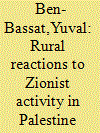

|
|
|
|
|
| Publication |
2013.
|
| Summary/Abstract |
The central Ottoman archives in Istanbul provide a unique bottom-up perspective on the early Zionist-Arab encounters in Palestine at the end of the nineteenth and early twentieth centuries and the interactions between the rural population and the first Zionist colonists. This perspective is somewhat different from the customary outlook in the literature on early Arab reactions to Zionist activity which has primarily focused on the reactions of the educated urban elites in the aftermath of the Young Turk revolution of 1908. This study discusses five petitions sent by the rural population of Palestine, both villagers and Bedouins, against Jewish activity and its impact on them. The petitions by these understudied subaltern groups reveal the complexities of the encounters between the two populations prior to the development of the political struggle in Palestine, and add a new dimension to the more familiar viewpoint provided by Zionist and European sources. This article thus seeks to examine the extent to which the revolution, which is commonly considered a watershed for the start of the Jewish-Arab political struggle, is reflected in these petitions. It also inquires whether there was a change of tone in the petitions following the revolution and, if so, what can be learned from them regarding the nature of Jewish-Arab relationships at the time.
|
|
|
|
|
|
|
|
|
|
|
|
|
|
|
|
| 7 |
ID:
120849


|
|
|
|
|
| Publication |
2013.
|
| Summary/Abstract |
This article analyses the creation of the accelerated Arabic language studies programme in the Israeli-Jewish school system, 'The Oriental Classes', over the years 1950-67. The article investigates the networks that enabled and controlled the 'Oriental Classes', the main actors involved in its operation, the aims of this programme as well as the ways to achieve them. It argues that this flagship programme serves as an example of the dominant orientation with which Arabic studies have been associated in Israeli-Jewish society, that of political and military intelligence needs, and that this can add a new angle to our understanding of the way Israel perceives the Arab world, vis-à-vis its relations with the Arab 'other' and the Palestinian citizens of Israel.
|
|
|
|
|
|
|
|
|
|
|
|
|
|
|
|
| 8 |
ID:
120851


|
|
|
|
|
| Publication |
2013.
|
| Summary/Abstract |
This article discusses the Centrist (Wassatiyya) position regarding Sunni-Shi?a relations, as articulated by the head of this stream, Yusuf al-Qaradawi. Because Centrists deem themselves the ideological heirs of Hasan al-Banna, founder of the Muslim Brotherhood in 1928, analysis of their position is also instructive of the Brotherhood's view on this important issue. The discussion is founded on al-Qaradawi's 'Principles for Sunni-Shi?i Dialogue', which derive historically from the Society for Reconciliation (Jama?at al-Taqrib) that was active in Egypt during the late 1940s. Centrists hold Shi?ites to be religious innovators (mubtadi?un), but not infidels, from which it follows in their view that Sunna and Shi?a divide over 'branches of religion', but not over 'roots of faith'. In this the Centrists are completely opposed by the Salafi Jihadi ideology, the ideological underpinning of the modern Global Jihad. With the desire to reconcile Sunna and Shi?a and unite them against a common global enemy, the Centrists must resolve the inevitable sectarian tensions as they crop up, e.g. the Sunni accusation that the Shi?a seek to actively proselytize the Sunni faithful in Sunni majority countries. In the Centrist view, Sunni-Shi?i reconciliation and dialogue are of practical necessity as regional politics diverge dangerously into a definite Shi?a bloc led by Iran, and a clear-cut Sunni bloc led by Saudi Arabia.
|
|
|
|
|
|
|
|
|
|
|
|
|
|
|
|
|
|
|
|
|